牛津英语教学设计
牛津英语教案
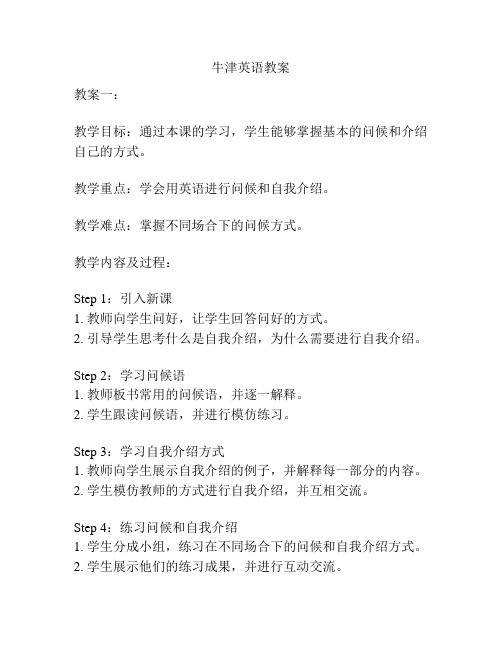
牛津英语教案
教案一:
教学目标:通过本课的学习,学生能够掌握基本的问候和介绍自己的方式。
教学重点:学会用英语进行问候和自我介绍。
教学难点:掌握不同场合下的问候方式。
教学内容及过程:
Step 1:引入新课
1. 教师向学生问好,让学生回答问好的方式。
2. 引导学生思考什么是自我介绍,为什么需要进行自我介绍。
Step 2:学习问候语
1. 教师板书常用的问候语,并逐一解释。
2. 学生跟读问候语,并进行模仿练习。
Step 3:学习自我介绍方式
1. 教师向学生展示自我介绍的例子,并解释每一部分的内容。
2. 学生模仿教师的方式进行自我介绍,并互相交流。
Step 4:练习问候和自我介绍
1. 学生分成小组,练习在不同场合下的问候和自我介绍方式。
2. 学生展示他们的练习成果,并进行互动交流。
教学延伸:可让学生用英语进行角色扮演,模拟不同场合下的问候和自我介绍情景。
教学反思:本节课通过多种形式的练习,帮助学生掌握了基本的问候和自我介绍方式。
在今后的教学中,应该进一步加强学生的口语表达能力训练,提高他们在实际交流中的能力。
2024年初中牛津上海版英语教案
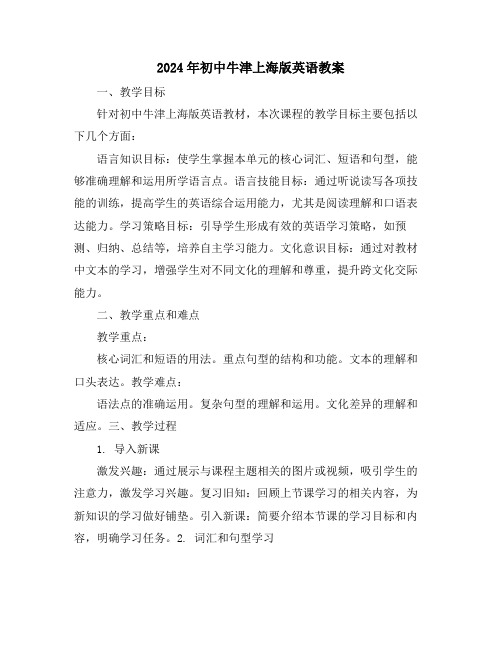
2024年初中牛津上海版英语教案一、教学目标针对初中牛津上海版英语教材,本次课程的教学目标主要包括以下几个方面:语言知识目标:使学生掌握本单元的核心词汇、短语和句型,能够准确理解和运用所学语言点。
语言技能目标:通过听说读写各项技能的训练,提高学生的英语综合运用能力,尤其是阅读理解和口语表达能力。
学习策略目标:引导学生形成有效的英语学习策略,如预测、归纳、总结等,培养自主学习能力。
文化意识目标:通过对教材中文本的学习,增强学生对不同文化的理解和尊重,提升跨文化交际能力。
二、教学重点和难点教学重点:核心词汇和短语的用法。
重点句型的结构和功能。
文本的理解和口头表达。
教学难点:语法点的准确运用。
复杂句型的理解和运用。
文化差异的理解和适应。
三、教学过程1. 导入新课激发兴趣:通过展示与课程主题相关的图片或视频,吸引学生的注意力,激发学习兴趣。
复习旧知:回顾上节课学习的相关内容,为新知识的学习做好铺垫。
引入新课:简要介绍本节课的学习目标和内容,明确学习任务。
2. 词汇和句型学习呈现新词汇:通过实物、图片或多媒体等方式呈现新词汇,帮助学生直观理解。
讲解词汇用法:详细解释新词汇的用法,包括词性、搭配等,并给出例句。
句型操练:通过替换、填空等方式,让学生操练重点句型,加深对句型的理解。
3. 文本理解和口头表达阅读文本:指导学生阅读教材文本,注意理解文本中的重点信息和语言点。
小组讨论:组织学生进行小组讨论,就文本内容展开讨论,培养口语表达能力。
汇报交流:每个小组选派代表汇报讨论成果,其他同学进行点评和补充。
4. 语法点讲解和练习呈现语法点:明确本节课的语法点,通过例句展示其用法。
讲解语法规则:详细解释语法点的构成和用法,帮助学生理解。
语法练习:设计多种形式的练习,如填空、选择、改写等,让学生充分练习。
5. 文化差异理解和适应对比文化:通过对比中英文化中的相似点和差异点,帮助学生理解文化差异。
讨论交流:组织学生就文化差异进行讨论交流,分享自己的见解和体验。
Unit3Colors(教学设计)牛津沪教版英语一年级下册(1)
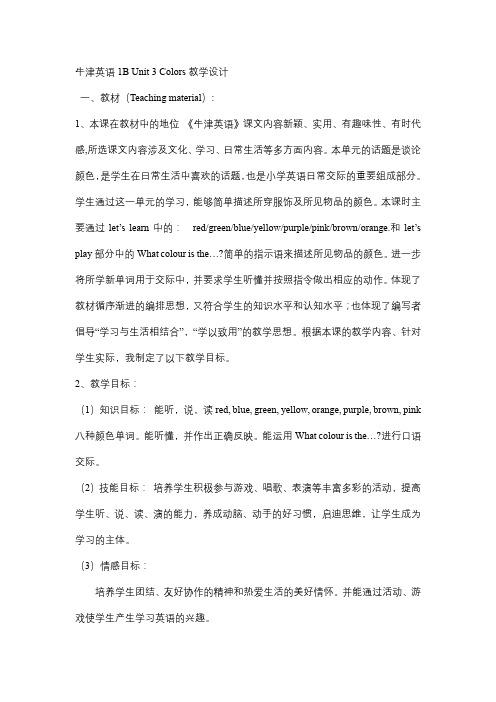
牛津英语1B Unit 3 Colors教学设计一、教材(Teaching material):1、本课在教材中的地位《牛津英语》课文内容新颖、实用、有趣味性、有时代感,所选课文内容涉及文化、学习、日常生活等多方面内容。
本单元的话题是谈论颜色,是学生在日常生活中喜欢的话题,也是小学英语日常交际的重要组成部分。
学生通过这一单元的学习,能够简单描述所穿服饰及所见物品的颜色。
本课时主要通过let’s learn中的:red/green/blue/yellow/purple/pink/brown/orange.和let’s play部分中的What colour is the…?简单的指示语来描述所见物品的颜色。
进一步将所学新单词用于交际中,并要求学生听懂并按照指令做出相应的动作。
体现了教材循序渐进的编排思想,又符合学生的知识水平和认知水平;也体现了编写者倡导“学习与生活相结合”,“学以致用”的教学思想。
根据本课的教学内容、针对学生实际,我制定了以下教学目标。
2、教学目标:(1)知识目标:能听,说,读red, blue, green, yellow, orange, purple, brown, pink 八种颜色单词。
能听懂,并作出正确反映。
能运用What colour is the…?进行口语交际。
(2)技能目标:培养学生积极参与游戏、唱歌、表演等丰富多彩的活动,提高学生听、说、读、演的能力,养成动脑、动手的好习惯,启迪思维,让学生成为学习的主体。
(3)情感目标:培养学生团结、友好协作的精神和热爱生活的美好情怀。
并能通过活动、游戏使学生产生学习英语的兴趣。
3、教学重点和难点: 本课时的教学重点是:学会八种颜色的单词,会灵活运用What colour is the…?进行口语交际。
难点是:单词“red, green”的读音;及如何结合实际生活, 创设语言环境, 拓展学生对颜色的应用,让学生学以致用。
4、教学准备:(1)多媒体课件;(2)八个颜色的壁虎;(3)单词卡片;(4)小组比赛的红苹果磁贴。
牛津英语教学设计

牛津英语教学设计本课是上海教育出版社《义务教育课程标准实验教科书《Oxford English》牛津英语7A,《Starter Unit6 ,My neighbourhood ——Lesson 2 Our housing estate》。
教学目标:1、知识目标:1)使学生能够灵活应用英语谈论不同地点的位置关系,进而能够用英语描述生活的社区。
2)使学生理解、掌握、学会应用新词汇:kindergarten fountain tennis court floor top2、能力目标:1)培养学生英语的听说能力。
2)通过欣赏歌曲图片、游戏和绘图等活动来刺激学生的多种感官,提高学生的综合能力,发展学生的多元智能。
3、情感目标:1)通过师生间、小组间谈论自己生活的社区,激发学生热爱家园、热爱集体的热情,培养学生的团结协作精神和积极向上的竞争意识。
2)创设丰富的学习活动,直观、形象的让学生感知英语、学习英语,激发学生学习英语的兴趣,让学生体会到学习的快乐,成功的快乐。
教学重难点:重点:1、让学生用英语熟练的谈论不同地点的位置关系(应用词组in front of/ behind /on the left of /on the right of),描述生活的小区。
2、使学生学习、掌握新词汇:重点词汇:playground操场kindergarten幼儿园block大楼shop商店fountain喷泉,garden花园tennis court网球场swimming pool游泳池school 学校floor层3、语法聚焦:1)特殊疑问句Where do/does sb live?句型;2)表示方位的介词:in front of在……前面behind在……后面on the right of在……右面on the left of在……左面(ask the students to use these phrases to express their seat in the classroom,like this:a.I’m in front of Tom.b.Tom is behind me.c.Jim is on the right of Lucy.d.Lucy is on the left of Jim.4、课文英汉对照Look and readBen and Kitty live in a housing estate.本和基蒂住在一个住宅区里。
牛津小学英语教学设计(优秀10篇)

牛津小学英语教学设计(优秀10篇)牛津小学英语说课稿1我今天说课的内容是PEP Book2 Unit6 At the zoo PartA的第一课时,包括Let’s learn和Let’s do两部分。
一、教材分析1、教材内容本单元是围绕“big 、small等形容词”这一题材展开的单词及句子。
本课时主要呈现几个形容词“big、small;tall、short;long、short”,通过看、猜等活动激发学生学习英语的兴趣和欲望。
结合新课程标准和大纲提出的基础教育阶段英语课程的总体目标和具体要求,我将本课时的教学目标设计如下:1、语言知识目标:能听、说、认读形容词:big、small;tall、short;long、short,并能够在实际的情境中恰当地运用。
2、语言技能目标:① 能听清形容词,并根据指令做出相应的动作。
② 根据图片说出单词和句子。
③ 有节奏地说、做Let’s do。
3、情感态度目标:通过本课时的学习,使学生有兴趣听、说英语,做游戏,敢于开口,乐于模仿,在鼓励性评价中使学生树立信心,在小组活动中积极参与合作,从而意识到交流对于学习英语的重要意义。
充分利用教材和教师的多媒体教学所提供的学习资源,实现自由参与和创新,能主动与他人交流,并克服交流中碰到的困难,使交际顺利地进行。
2、本课时的重难点:1、正确听、说、认读形容词:big、small;tall、short;long、short,并能够在实际的情境中恰当地运用。
2、能听清形容词,并根据指令做出相应的动作,而且能有节奏地说、做Let’s do。
我主要是通过复习旧知识——设置认识——灵活运用这三个主要步骤来突破教材的重难点的。
在教学开始让学生以旧带新引入新知,通过对教材的了解感知新任务,并在教师用图片、多媒体课件等多种媒介的感官刺激下实现对知识的体验和实践,最后在真实的生活情境中运用、实现能力的发展。
二、说教法和学法1、组织教学,创设氛围小学英语教学的编排特点是活泼有趣,三年级的学生又活泼又好动。
牛津英语教学设计

牛津5B Unit 1 A new term教案第一课时一、教学内容:5B. Unit 1 A部分Read and Say二、教学目标:1.能正确理解、掌握A部分会话,并能朗读、初步表演对话。
2.能正确地运用对话中出现的日常交际用语。
3.初步掌握会话中出现的四会单词Monday, a subject, Chinese, Science, Computer studies, interesting, a week和句型。
4.掌握会话中出现的三会单词term, Art, PE, about, interesting。
三、教学重点能正确理解对话内容并能朗读和初步表演对话。
四、教学难点能比较流畅的朗读对话,并能在掌握对话的基础上分角色表演。
五、教具准备录音、图片六、教学过程Step 1. Revision1.Play a game: “反口令”游戏2.Free talk.A: I have a … What do you have?B: I have a …A: I like going shopping. What do you like?C: I like …Step2. Presentation1.教学句型“What subject do you like?”“I like…”(由对话自然引出)T: We are having an English lesson. Do you like English? Ss: Yes,I do. /No , I don’t. (师帮助学生回答)T: What subjects do you like? (生跟读,出示板书)S1: I like … (师作提示)2.Teach: How about you?师指明一名学生:How about you? 生自然地理解并作答,师可稍作提示“I like …”3.Drilla.师问生,直观呈观句型运用的情景,为学生自己开口说作铺垫。
牛津英语单元整体教学设计
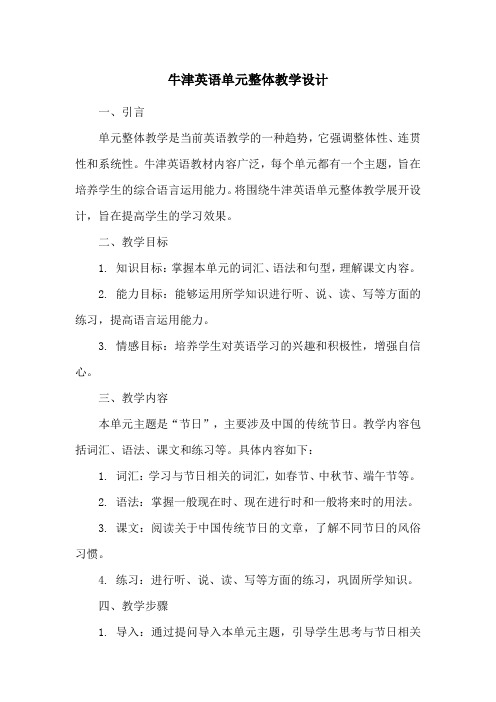
牛津英语单元整体教学设计一、引言单元整体教学是当前英语教学的一种趋势,它强调整体性、连贯性和系统性。
牛津英语教材内容广泛,每个单元都有一个主题,旨在培养学生的综合语言运用能力。
将围绕牛津英语单元整体教学展开设计,旨在提高学生的学习效果。
二、教学目标1. 知识目标:掌握本单元的词汇、语法和句型,理解课文内容。
2. 能力目标:能够运用所学知识进行听、说、读、写等方面的练习,提高语言运用能力。
3. 情感目标:培养学生对英语学习的兴趣和积极性,增强自信心。
三、教学内容本单元主题是“节日”,主要涉及中国的传统节日。
教学内容包括词汇、语法、课文和练习等。
具体内容如下:1. 词汇:学习与节日相关的词汇,如春节、中秋节、端午节等。
2. 语法:掌握一般现在时、现在进行时和一般将来时的用法。
3. 课文:阅读关于中国传统节日的文章,了解不同节日的风俗习惯。
4. 练习:进行听、说、读、写等方面的练习,巩固所学知识。
四、教学步骤1. 导入:通过提问导入本单元主题,引导学生思考与节日相关的内容。
2. 新课呈现:通过图片、视频等方式呈现新知识,激发学生的学习兴趣。
3. 讲解与示范:教师讲解词汇、语法和句型,示范正确的发音和用法。
4. 课堂互动:组织学生进行小组讨论、角色扮演等活动,加强语言实践。
5. 巩固练习:布置相关练习,如听录音、朗读课文、写作等,巩固所学知识。
6. 总结与评价:对本节课所学内容进行总结,评价学生的学习效果,提出改进意见。
7. 作业布置:布置相关作业,要求学生回家后复习本单元所学内容,预习下一单元内容。
五、教学反思本节课整体上达到了预期的教学目标,但也存在一些不足之处。
在今后的教学中,应更加注重学生的参与度和课堂氛围的营造,激发学生的学习兴趣和积极性。
同时,要加强对学生学习方法和策略的指导,帮助学生更好地掌握所学知识,提高学习效果。
牛津英语教学设计

Unit 1 The first day at school(第二课时)一、教学内容D Work in pairs F Look, find and say H Sing a song二、教学目标a)四会句型:How many … are there in/on/near …? There’s/There are …b)三会单词streetc)会唱歌曲 Two jackets三、教学重点1、能正确地听、说、读、写句型How many … are there in/on/near …? Ther e’s/There are …2、复习数词。
3、能正确地听、说、读单词street。
4、会唱歌曲 Two jackets四、教学难点1能正确地听、说、读、写句型How many … are there in/on/near …? There’s/There are …2 介词in, on, near的正确运用。
五、教学准备1、教具准备1)物品 two jackets及其它2)关于本课时的多媒体课件。
3)制作调查表。
2、板书准备:写好课题和日期。
六、教学过程Step 1 Free talk/ Revision1 Sing a song: In the classroom2 T: Is there a … in/on/near the desk/pencil box/classroom/school?Are there any …in/on/near the desk//pencil box/classroom/school?The students answer the questions.板书Is there a … in/on/near the desk/cla ssroom/school?Yes, there is/are. No, there isn’t/aren’t.Step 2 Presentation and pratice1 Put the two jackets on a chair.T: Are there any jackets on the chair?S: Yes, there are.T: How many jackets are there on the chair? 板书There are …S: There are two.Ask and answer in pairs.2 T: Let’s learn a song about the two jackets.First, listen to the song. Then sing together.3 出示D部分图1T:How many TV rooms are there in the building?S: There are four.Practice in pairs.4 Show the other pictures and practice in pairs.Check the answers.反馈时带领学生拼读twenty, thirty, forty等数词。
和教学反思牛津英语9A第四单元教案及词汇教学的教学设计

(三)情感态度与价值观
在本章节的教学中,学生将形成以下情感态度与价值观:
1.学生能够认识到学习英语的重要性,激发学习兴趣,树立自信心。
2.学生能够尊重和包容不同的文化,培养跨文化交际意识。
3.学生能够关注科技发展对社会生活的影响,提高对社会问题的敏感度。
(二)过程与方法
在本章节的教学过程中,学生将通过以下方法提高英语能力:
1.采用任务型教学法,让学生在完成具体任务的过程中,自然而然地学习和运用英语。
2.利用小组合作学习,培养学生团队合作精神,提高学生的口语表达能力。
3.通过听力训练,让学生掌握听力技巧,提高听力水平。
4.创设真实的语境,让学生在实际语境中运用所学知识,提高语言实践能力。
4.学生能够在学习过程中,形成良好的学习习惯,培养自主学习和合作学习的能力。
5.学生能够通过英语学习,提升自我表达能力,增强沟通技巧。
二、学情分析
在本章节的教学中,针对牛津英语9A第四单元,我们进行以下学情分析:
1.学生特点:九年级学生已经具备一定的英语基础,对英语学习有一定兴趣,但个体差异较大。部分学生可能在词汇、语法和口语表达方面存在困难。
2.听力理解:提高学生对本单元话题相关听力材料的理解能力,是教学的另一个重点。
-重难点突破设想:设计不同难度的听力练习,逐步提高学生的听力水平。引导学生关注听力材料中的关键信息,培养其听力技巧。
3.口语表达:学生在口语表达中,往往存在词汇量不足、句子结构单一等问题。
-重难点突破设想:组织角色扮演、小组讨论等活动,为学生提供口语实践机会。鼓励学生使用所学词汇和语法,提高口语表达能力。
1.学生需按时完成作业,保持书写工整、清晰。
英语新课标教学设计:牛津英语6B Unit6 A healthy diet

英语新课标教学设计:牛津英语6B Unit6 A healthy diet (Revison)一、教材分析译林版《英语》教材每个单元都围绕具体主题展开,在6BUnit6 A healthy diet中,饮食类话题因食物所具有的美好、吸引人的特点,是学生乐于讨论的话题。
如今,健康的饮食习惯也已成为人们关注的话题。
本单元有许多食物相关词汇,笔者以各知识点的复习、归纳为主,设计了多样的教学活动。
其中,通过学科融合,以柱状统计图反馈班级学生饮食情况的调查结果是本课的亮点。
二、学情分析学生经过三年的英语学习,对于词汇的积累和交际语的使用已融会贯通,具备一定的英语表达能力。
鉴于本课前三课时的教学,在本课中,教师尽可能地放手让学生自主参与,充分发挥学生的主体作用, 以更多与学生真实生活相关的信息为载体,使学生对这一话题“健康饮食”有更深入的了解,促进学生深度学习。
在教学方法上力求具体、生动、形象。
对文本的感知、细节的理解、语感的训练尽量采用直观的和统计图,使学生对文本的理解更透彻。
三、教学目标(一)知识目标:1.复习并掌握本单元Story time和Cartoon time的内容,能复述和运用。
2.复习并巩固本单元Grammar time所学量词的用法,能正确运用。
不健康食品的范畴,复习频率副词;问题3有关“垃圾食品”,比甜食的不健康程度严重些;问题4调查学生喝水习惯,与生活密切相关。
本课主题“健康饮食”假设只停留在课文内容、重难点操练和饮食知识提供上,或许无法真正在学生心中埋下健康饮食的种子,那么在班里开展问卷调查的形式,真正去了解学生饮食情况,健康饮食的话题将不再是空中楼阁,其调查结果的呈现对于学生的影响必定会更加深入。
4.呈现调查结果数据统计【设计意图】第一张统计图教师给出结论。
后三张学生自己观察统计图传递的信息进行填空。
直观的数学统计图形式,带给学生很大的震撼。
此处“学科融合”的方式打破了英语和数学学科之间的壁垒, 融通不同学科的知识和能力,共同指向真实情境中的问题探索与解决,提升跨学科素养。
英语新课标教学设计:牛津英语8A Unit 1 Friends Reading1

英语新课标教学设计:牛津英语8A Unit 1 Friends Reading1一、教材分析本课的教学内容是《江苏牛津译林版》八年级上册 Module 1 Teenage life Unit 1 Friends—Best friends (Reading1),本课的主题语境为人与社会——社会服务与人际沟通(人际关系),语篇类型为记叙文中的人物介绍。
【What】本课由三篇记叙文组成,三篇文章均以朋友为题材,表达对朋友的认识和对友谊的体会。
三个好朋友Betty,Max 和May,虽然性格和品质等方面都有所不同,但是和作者们之间的友谊是真实强烈的。
【Why】三位作者通过对Betty,Max 和May三个好朋友生动形象的描述,使读者从细节角度感知朋友的重要和友谊的珍贵,并从中得到如何认识“真朋友”的启迪,启发学生对于真正友谊的思考。
【How】三篇文章结构清晰,从外貌,性格,品质,梦想多个方面描述,使Betty,Max 和May的形象丰满立体。
除了运用大量丰富的形容词描写性格和外貌之外,还用了具体的事例和大量的细节描写塑造了鲜明的人物形象。
用always/never/so 等副词以及感叹号等标点符号等表达了对朋友真实强烈的感情。
二、学情分析本课的教学对象为初二学生,学生通过对前一课时Welcome to the unit &Comic strips 的学习,掌握了很多描写朋友性格的词汇,对“最好的朋友”这个话题也有很浓厚的表达兴趣。
学生已经具备一定的处理表层信息的能力,但是如何筛选整合信息和挖掘深层信息的能力还有待加强。
同时在梳理文章结构,解读语言特征方面还需要老师的引导。
如何搭建合适的支架锻炼学生的思维品质和培养迁移运用能力是本课的教学难点。
三、教学目标1. 学习能力:学生能获取和梳理Betty, Max和May 三位好朋友的基本信息(外貌,性格及其他),借助阅读形成的结构化知识,进行选择判断。
牛津英语1A Unit 1 my Classroom【优秀6篇】

牛津英语1A Unit 1 my Classroom【优秀6篇】《牛津小学英语》1A Unit 1教学设计篇一教学内容:《牛津小学英语》6b unit 6补充习题教学目标:1. 熟练掌握本单元所学内容。
2. 掌握《补充习题》内容。
教学重点:熟练掌握本单元所学内容。
教学难点:掌握《补充习题》内容。
教具准备:录音机、磁带等。
教学过程:step 1 warm up1. greetings2. free talk学生以小组形式就本单元所学的日常交际用语进行交谈。
step 2 presentation and consolidation1. listen and choose.①教师指导学生理解图意,说出短语。
②学生听录音完成练习。
③集体订正,再听录音,指名学生重复。
2. listen and tick.①教师指导学生看表格并说出短语。
②学生听录音完成练习。
③集体订正,再听录音,指名学生重复。
3. read and write.①学生独立完成练习。
②集体订正,教师相机板书。
③学生画出短语,校正答案。
④学生齐读。
4. look, think and write.①学生独立完成练习。
②集体订正,教师相机板书。
③学生画出短语,校正答案。
④学生讨论易错的地方,并汇报交流。
⑤学生齐读。
5. look, read and write.①学生独立完成练习。
②集体订正,教师相机板书。
③学生找出短语并校对答案。
④学生齐读。
6. read and answer.①学生独立完成练习。
②教师带学生看短文后问题并讲解其含义。
③教师带学生读短文,理解其意。
④学生找出短语,师生校对答案。
⑤讲解短文后问题答案并板书。
⑥学生齐读。
step3 homework.1. 写补充习题c read and write 和e look, read and write 1 遍。
2. 复习本单元所学内容。
①四会单词和四会句型默1遍,保证会默。
②读unit 6 的书1遍并试着背诵或复述。
牛津小学英语5BUnit9TheEnglishClub教案

牛津小学英语5BUnit9TheEnglishClub教案牛津小学英语 5B Unit 9 The English Club(教案)Unit 9 The English Club(教案)一、教学内容Unit 9 The English Club (A部分)二、教学目标 1.听得懂、会说、会读、会拼写单词:China,Chinese,UK,British,USA,American,Japan,Japanese,France,Fr ench. 2.听得懂、会说、会读日常交际用语及句型:Are you from different countries? I ’ d like to visit it. 3.听得懂、会说、会读、会写句型:Where are you from? I’m /He’s/She’s/It’s/We’re/They’re from … Do you speak …? Yes,I do. I speak …,too. No,I don’t. I speak … 三、教学难点 1.听得懂、会说、会读日常交际用语及句型:Are you from different countries? I ’ d like to visit it. 2.听得懂、会说、会读、会写句型:Where are you from? I’m /He’s/She’s/It’s/We’re/They’re from … Do you speak …? Yes,I do. I speak …,too. No,I don’t. I speak … 四、教学准备学生名片,PPT课件,课堂听力练习,图片。
五、教学步骤Teaching procedures:Step1:Greetings 1 Say hello to students. 2 Free talk 3 Sing a song Step2: Presentation 1 Introduction. T: My name is Mr Dou.I’m from China.I’m Chinese and English.I like te aching English.I often have English lessons for you. I want to know ‘who are you?’ S1:… S2:… … 2Visit some countries. T: What country is it? S: It’s … 3 Visit some cities. 4 Visit the Olympic Club 新授:club 俱乐部;visit参观、访问;visitor 参观者。
牛津英语教学设计

Unit 1 The Second Period(第二课时)一教学内容:5B. Unit 1 B部分Look, read and learn二教学目标:1 继续学习句型What day is it today? What subject doyou like? What subject do you have on Monday?What lessons do you have in the morning? 并能初步运用句型。
2 Monday, Tuesday, Wednesday, Thursday, Friday, a subject, Chinese, English的四会掌握。
3 能正确地听、说、读词Sunday, Saturday, Social Science,Art, PE.4 How about you? 的正确使用。
三教学重、难点:1.掌握本单元四会单词和三会单词。
2.能初步运用四会句型。
3.熟练运用日常交际用语。
四、课前准备:1.准备好B部分的词汇图片。
2.让学生准备一份台历和各门科目的教课书。
3.在黑板上预先写好课题Unit 1 A new term。
五教学过程:A Listen to a song 听本单元歌曲两遍,边听边用手打节拍。
B Free talk 师生交流T: Good morning, boys and girls.Ss: Good morning, Miss Li.T: Nice to see you again.Ss: Nice to see you, too.T: Welcome back to school.Ss: Thank you.T: What day is it today?What subject do you like?What subject do you have on Monday?What lessons do you have in the morning?C Revision 复习1 出示A部分会话投影片,看图进行师生会话。
牛津英语教学设计
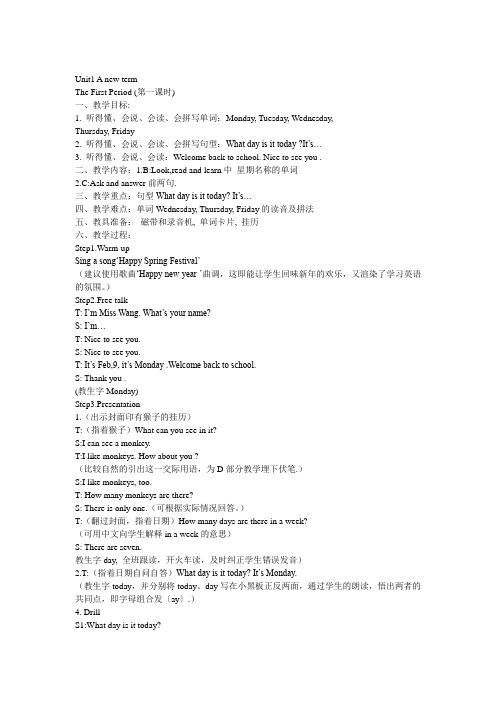
Unit1 A new termThe First Period (第一课时)一、教学目标:1. 听得懂、会说、会读、会拼写单词:Monday, Tuesday, Wednesday,Thursday, Friday2. 听得懂、会说、会读、会拼写句型:What day is it today ?It’s…3. 听得懂、会说、会读:Welcome back to school. Nice to see you .二、教学内容:1.B:Look,read and learn中星期名称的单词2.C:Ask and answer前两句.三、教学重点:句型What day is it today? It’s…四、教学难点:单词Wednesday, Thursday, Friday的读音及拼法五、教具准备:磁带和录音机, 单词卡片, 挂历六、教学过程:Step1.Warm-upSing a song‘Happy Spring Festival’(建议使用歌曲‘Happy new year ’曲调,这即能让学生回味新年的欢乐,又渲染了学习英语的氛围。
)Step2.Free talkT: I’m Miss Wang. What’s your name?S: I’m…T: Nice to see you.S: Nice to see you.T: It’s Feb,9, it’s Monday .Welcome back to school.S: Thank you .(教生字Monday)Step3.Presentation1.(出示封面印有猴子的挂历)T:(指着猴子)What can you see in it?S:I can see a monkey.T:I like monkeys. How about you ?(比较自然的引出这一交际用语,为D部分教学埋下伏笔.)S:I like monkeys, too.T: How many monkeys are there?S: There is only one.(可根据实际情况回答。
牛津英语精美教学设计8A Unit 1 Friends
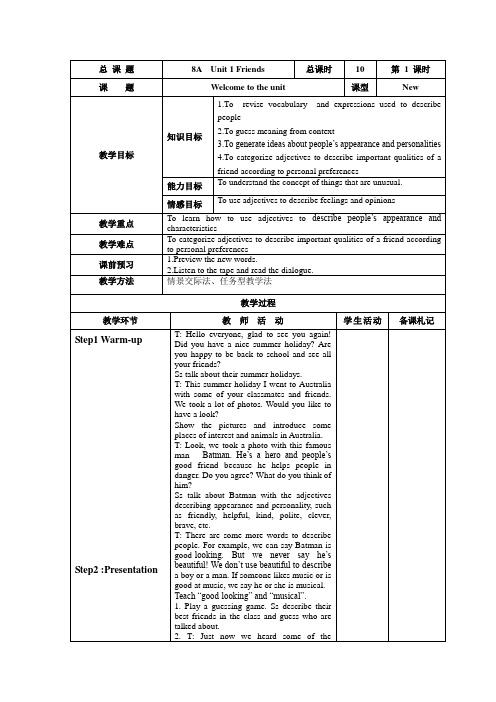
To categorize adjectives to describe important qualities of a friend according to personal preferences
课前预习
1.Preview the new words.
2.Listen to the tape and read the dialogue.
Teach “good-looking” and “musical”.
1. Play a guessing game. Ss describe their best friends in the class and guess who are talked about.
2. T: Just now we heard some of the students talk about their best friends. Could you tell me which words are used most often?
总课题
8A Unit 1 Friends
总课时
10
第1课时
课题
Welcome to the unit
课型
New
教学目标
知识目标
1.To revise vocabulary and expressions used to describe people
2.To guess meaning from context
能力目标
To understand the concept of things that are unusual.
情感目标
To use adjectives to describe feelings and opinions
(牛津英语4B)教学设计

(牛津英语4B)教学设计(Oxford English 4b) teaching design(牛津英语4B)教学设计前言:小泰温馨提醒,英语作为在许多国际组织或者会议上都是必需语言,几乎所有学校选择英语作为其主要或唯一的外语必修课。
英语教学涉及多种专业理论知识,包括语言学、第二语言习得、词汇学、句法学、文体学、语料库理论、认知心理学等内容。
本教案根据英语课程标准的要求和针对教学对象是小学生群体的特点,将教学诸要素有序安排,确定合适的教学方案的设想和计划、并以启迪发展学生智力为根本目的。
便于学习和使用,本文下载后内容可随意修改调整及打印。
unit 1 a new student 第一课时一、教学内容unit 1 a: read and say.二、教学目标 1、理解,掌握对话内容,用正确的语音语调朗读对话,初步表演对话。
2、正确运用日常交际用语welcome to our school. who’s that boy? i’m new here.3、能正确的听、说、读单词 boy, woman, teacher, student, nurse三、教学重点能正确理解对话内容,朗读对话,初步表演对话四、教学难点流畅地朗读对话,并能在理解对话内容的基础上表演对话五、课前准备 1、人物图片 mike ( student ),miss li( teacher ) miss king ( nurse)gao shan (student )人物头饰 ben2、单词卡片 student, teacher, woman, teacher ,boy六、教学过程(一)free talk1、hello, nice to meet you.2 、how are you ? / how are you this morning?3 、are you happy today?4 、welcome back to school.5、good morning. glad to meet you. welcome back to school.(二)presentation and practice: ask and answer1、good morning, boys and girls . glad to meet you . welcome back to school. 出示 welcome back to school. 理解并领读。
上海六年级牛津英语教案范文(20篇)

上海六年级牛津英语教案范文(20篇)(实用版)编制人:__________________审核人:__________________审批人:__________________编制单位:__________________编制时间:____年____月____日序言下载提示:该文档是本店铺精心编制而成的,希望大家下载后,能够帮助大家解决实际问题。
文档下载后可定制修改,请根据实际需要进行调整和使用,谢谢!并且,本店铺为大家提供各种类型的实用资料,如工作总结、工作报告、党团范文、工作计划、演讲稿、活动总结、行政公文、文秘知识、作文大全、其他资料等等,想了解不同资料格式和写法,敬请关注!Download tips: This document is carefully compiled by this editor.I hope that after you download it, it can help you solve practical problems. The document can be customized and modified after downloading, please adjust and use it according to actual needs, thank you!Moreover, our store provides various types of practical materials for everyone, such as work summaries, work reports, Party and Youth League model essays, work plans, speeches, activity summaries, administrative documents, secretarial knowledge, essay summaries, and other materials. If you want to learn about different data formats and writing methods, please stay tuned!上海六年级牛津英语教案范文(20篇)教案是教师教学的规划和组织,能提高教学效果和学生学习质量。
单元整体教学设计 牛津英语

单元整体教学设计牛津英语
一、教学目标
1. 语言知识目标:掌握本单元的词汇和语法知识,包括单词、短语、时态和句型等。
2. 语言技能目标:培养学生的听、说、读、写等语言技能,特别是阅读和写作能力。
3. 情感态度目标:培养学生对英语学习的兴趣和积极性,增强学生的自信心和合作精神。
4. 学习策略目标:引导学生运用有效的学习策略,如归纳总结、对比分析、推理判断等。
5. 文化意识目标:培养学生的跨文化意识和交流能力,了解英语国家的文化背景和社会习俗。
二、教学内容
本单元的主题是“Travel”,主要介绍旅行的方式、目的地、旅行准备等方面的内容。
教学内容包括课文、单词、语法、练习和活动等。
三、教学步骤
1. 导入:通过展示一些旅行照片或视频,引导学生谈论自己的旅行经历和感受,从而引出本单元的主题。
2. 课文讲解:通过讲解课文内容,让学生了解旅行的方式、目的地、旅行准备等方面的知识,同时教授单词和短语。
3. 语法讲解:通过讲解语法知识点,让学生掌握本单元的语法重点和难点,并进行相应的练习。
4. 写作练习:结合本单元的主题,让学生进行写作练习,如写一篇关于自己旅行经历的文章。
5. 口语练习:通过小组讨论、角色扮演等形式,让学生进行口语练习,提高口语表达能力。
6. 作业布置:布置相关作业,巩固所学知识,同时为下节课做好准备。
四、教学评价
通过课堂表现、作业完成情况、测试等方式对学生的学习情况进行综合评价,及时发现问题并采取相应的措施进行改进。
- 1、下载文档前请自行甄别文档内容的完整性,平台不提供额外的编辑、内容补充、找答案等附加服务。
- 2、"仅部分预览"的文档,不可在线预览部分如存在完整性等问题,可反馈申请退款(可完整预览的文档不适用该条件!)。
- 3、如文档侵犯您的权益,请联系客服反馈,我们会尽快为您处理(人工客服工作时间:9:00-18:30)。
Unit 4 第2课时
一、教学内容:D&A
二、教学目标:
技能目标:
1. Four skills: an e-mail, busy, town, usually, what does she usually do? He/she usually …
2. Three skills: I’m busy.
3. Require the students to read and act the dialogue
三、教学重点:
1. Four skills: an e-mail, busy, town, usually, what does she usually do? He/she usually…
2. Three skills: I’m busy.
四、教学难点:
1. Require the students to read and act the dialogue
五、教具准备:
1. 教学挂图。
2. 录音机和磁带。
3. 单词卡片和小黑板。
六、教学过程:
Step 1. Free talk
1. T(对话某男生):What do you usually do on Sundays?
S1: I usually play basketball.
T: Do you know Yao Ming? (课件中播放一小段姚明打篮球的视频)
T(转向全体学生):Do you like him?/Does he play basketball well?
引导Ss: Yes, I do. / Yes, he does.
同法T再播放一段游泳运动员田亮游泳的视频,重复刚才的问题,从而来导入新授单词: well.
T带领学生: well, well w-e-l-l, swim well, play basketball/football well.(引导学生边说边做动作),让学生举例与well搭配的词组
2. T: Let's read the phrases of part B.
walk walk walk carefully
sit sit sit quietly
dance dance dance beautifully
speak speak speak loudly
run run run fast
jump jump jump high
2.(出示C图)
T: Does Mike jump high?
S: Yes, he does.
T: Does Yang Ling dance beautifully?
S: Yes, she does.
T: Does Nancy run fast?
S: No, she doesn’t.
T: Now ask and answer in pairs.
Step 2 Presentation and practice
1.(课件中呈现几张我在星期天做的事情的图片:看电视,购物,做家务等)
T:I usually watch TV, go shopping ,water flowers and do housework on Sundays. I’m busy. I’m not free.
Are you busy on Sundays? Are you free on Sundays?
引导学生:Yes … /No …
T: But are you free now? (以旧知导新知,以助学生更好的理解)
What are we doing now?
Ss: We are having an English lesson. We are not free now.
T: Yes, we are busy now. We are not free.
出示小黑板:busy [i] [i] busy, be busy (告知学生形容词与be动词连用)
学生开火车式:busy, b-u-s-y ,I’m busy .We are busy.(让学生感知be busy 的用法)
1.T: (用学生带的生活照)Does … usually …?
S: 回答
T: 新授usually
T: (用另一张照片)Do es … usually…?
S: No, he/she doesn’t.
T: What does he/she usually do?
S: (引导)He/She usually … .
T: (板书新句型)What does he/she usually do …?
He/She usually … .
S: Read the sentences
T: (出示D部分的图)What does Mike usually do on Sundays?
S: He usually takes photos on Sundays.
T: Ask the students to practice the other three pictures.
S1: What does Yang Ling usually do on Saturdays?
S2: She usually makes clothes on Saturdays.
S3:S4: Picture 3 water flowers
S5S6: Picture4 read magazines
2. Look at the picture and talk about it.
T: Now look at the picture of part A and listen to the tape and then answer:
Q1: What is Wang Bing doing?
Q2: What does Gao Shan want?
S: Listen and answer.
T: Ask the students to read the three sentences.
3.T: What’s Wang Bing doing? Is h e surfing the Internet?
S: He’s writing an E-mail to … .
Yes, he is.
T: Is he free?
S: No, he’s busy.
引导E-mail, surf the Internet, busy (对于这些单词和词组的教授,要慢慢过渡,而且这些单词都是学生们比较感兴趣的,因此在学起来还是比
较容易的。
)
S: Read the words and phrases.
4. town
T: Does his friend live in a city or in a town?(教师要适当的解释town这个单词的中文意思。
)
5. Listen to the tape, answer the question.(可以适当增加听的遍数,也可以拿笔记下重要的句子)
d. Does Wang Bing’s friend live in London?
e. How old is his friend?
f. Does he usually play football?
g. Does he play well?
6. T: Now read the text after the tape.
Read it after the teacher.
Read it in pairs.
7. T: Now it’s your turn to practice the text in pairs.
S1S2: Act the text. (1—3groups)
D. Consolidation
1. Act the dialogue.
2. Talk about your own friends.
E. Assign homework:
1. Listen to the tape and read after the tape.
2. Copy the dialogues of part A.
板书
Unit 4 (A&D) Date A:What does… usually do …?
B:He/She usually…
教后记:。
